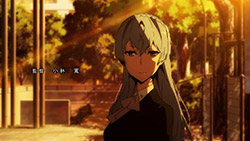 |
 |
 |
 |
 |
 |
 |
 |
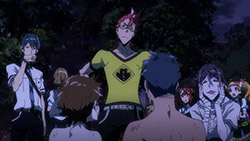 |
 |
 |
 |
 |
 |
 |
 |
 |
 |
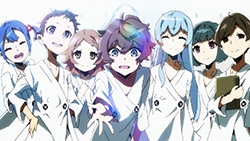 |
 |
 |
 |
 |
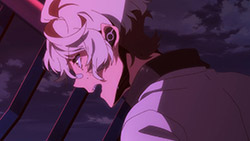 |
 |
 |
 |
 |
 |
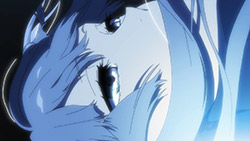 |
 |
 |
 |
 |
 |
 |
 |
 |
 |
 |
 |
 |
 |
 |
 |
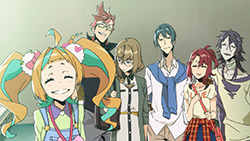 |
 |
 |
「世界中にキズナシステムが広がって」 (Sekaijuu ni Kizuna System ga Hirogatte)
“If The Kizna System Spread Throughout The World”
Narratively inconsistent. Thematically consistent.
I’ll be honest from the start. Kiznaiver’s finale did not go down the direction I wanted it to. The scale of the series seemed artificially stretched and the stakes excessively raised. The series has excelled in its latter half because of its intimate focus on its core cast of characters. It would seem counter-intuitive at this point to suddenly expand the scope to encompass an entire city. Not only this, but the only bulk of it was spent closing a very poorly, haphazardly construed character arc. With all that said, however, the finale was still able to make the most of its chosen course, and delivered on several powerful revelations for a satisfying conclusion.
Sonazaki has held an odd position throughout the series. She has for the most part, taken a background role, facilitating the developments and on-goings of our main cast. However, every now and then she’d unintentionally find herself amidst the action, especially in the case with Katsuhira’s feelings. Throughout all this, she has remained an enigma. Barely any of the screen time she was allotted involved exploring her personal motivations and goals. If the showrunners were attempting to construe a coherent character arc for her across the last eleven episodes, they didn’t do an awesome job.
That’s what makes her sudden time in the spotlight so baffling, especially in the last episode of the entire show. Much of the conflict amongst the main characters had yet to receive any closure—these are the narrative threads that should have been dealt with. While a few lines and segments of the finale attempted to conclude these characters arc, they weren’t enough. The sudden shift in focus was jarring and unnatural considering all that was being built up in previous episodes. It’s as if the writers felt obligated to clean up Sonozaki’s poorly executed character arc. The direction of this finale felt contrived and bizarre.
That being said, the finale itself provided plenty of fascinating ideas that built on previously developed themes. Previously I spoke about how Kiznaiver has enforced the idea that in order to truly bond with someone—to become their friend—you have to adopt each other’s pain and emotions. Friendship involves sharing not only joy and happiness, but also the bad stuff. It is only in bearing the burden of each other’s agony that we truly become friends. However, this episode makes a couple of more things clear about this exchange.
First off, this exchange is necessarily messy. Sonozaki stands in firm support of the Kiznaiver system as a mandatory instrument for empathy. The convenient, scientifically guided mechanic makes this emotional network clean and easy—friendship can be artificially engineered in this manner. However, Maki makes clear the necessity that friendships should entail emotional transparency, yes, but not clarity. The fact that we struggle in trying to understand each other’s anguish is integral to genuine friendship. In the all the confusion, doubting, second-guessing, and so on that comes with trying to take on others’ emotional burdens, a deeply intimate bond is born. The Kiznaiver system cannot provide this level of connection, for it makes the process too easy and literal. For friendship to be born, there has to be a struggle. There has to be a mess.
Additionally, this exchange establishes friendship, yes, but is merely the first step towards fulfilling it. We must carry each other’s emotional pain, but it is integral that we help each other overcome it. Sonozaki is stuck in the first step, refusing to let go of the others’ pain. She is binds herself to the initial connection which comes with adopting others’ emotions, which the Kiznaiver system initially supplies. However, because the Kiznaiver system’s method is too clear and transparent, for there is no mess. It’s clean and easy, why wouldn’t she want to hold on to it? As the otherchildren iterate, however, you’re fooling yourself by staying there. Sonozaki isn’t engaging in real, genuine friendship, but a self-centered level of satisfaction. Just like her, the children didn’t get to participate in the messiness and confusion of actually adopting each other’s emotions, and were thus left internally vapid. Sonozaki must take a page from the very friendship she helped facilitate, and truly come to grips with the pain of others. Friendship is about understanding each other’s pain, yes, but also about healing each other—in helping others understand their pain by taking some of it. It is then that we may return it to them, so that they can then properly deal with it. The main cast has all helped each other deal with each other’s internal agony—in overcoming it. With that comes the risk of losing them—in casting them aside once their pain has been dealt with, for what else bonds such different people afterwards? However, we must trust that there is more to these bonds than communal hardship—that after the storm has subsided, we can truly coexist as friends.
Now, could these ideas have been delivered more coherently? Yes. Are there some narrative contradictions concerning these themes? Absolutely. Regardless though, the finale manages to skillfully continue developing its messages of friendship, despite an awkward change in narrative focus. By the time all is said and done, I feel these characters have been vilified for the better. The closing scenes convey a great deal of growth amongst these characters. Even though I wish more time was spent providing closure, I nonetheless feel that our main cast’s friendship is genuine and well-deserved.
Final Impressions
If you read back to my review of Kiznaiver’s first installment, I was ecstatic. Though the episode itself wasn’t the most exciting or enthralling of debuts, I saw nothing but incredible potential for the series. The first episode alone promised so many great ideas and themes about empathy, our relationships with other people, the nature of pain, and so on. Further still, the production value was extraordinary—visuals and music alike were gorgeous, breathtaking, and evocative.
However, as the series continued, it failed to gain a lot of momentum. Many of the earlier episodes were far too scattered in focus. They attempted to balance so many narrative threads involving the main cast, Sonozaki, scientists, past occurrences, and so on. As a result, the show failed to convey many dramatic themes or ideas, and instead felt like it was perpetually stumbling and picking itself back up.
Then something changed in the series’ latter half. Suddenly the focus sat solely on the main characters, and the show vastly improved in quality. We finally started diving deep psychology and emotions of these characters, providing something more and more akin to the profound, character-centered story I wanted from the beginning. The Kiznaiver mechanic was actually utilized as a function of the narrative, and provided for a bevy of fascinating themes and ideas about the nature of friendship and the way we interact with one another. Though the finale was something of a disappointment, the series’ remains marked by the excellence of its last several episodes. Kiznaiver never met up to my perhaps bloated expectations, but it nonetheless stands as a provocative show with lovable characters, outstanding aesthetics, and profound philosophies.

So the beginning episodes setup a nice, sprawling sci-fi story with the potential to be a character study, but then shifted away from the overarching plot it developed in favor of giving the cast some development, which I was disappointed at but embraced later because the interactions between the main characters were fun. Throughout this though, 1) they made it clear they had not dropped the silly sci-fi aspect of the show despite their complete lack of focus towards it, 2) Sonozaki went entirely undeveloped and as a result, the finale had a disappointing emotional impact. And in addition to that, they even tried to reintroduce the sci-fi aspect. It went from world peace or something to an effort to save a bunch of kids from the experiment…the ideas were just too jumbled up.
Also, I thought the ending was a bit too clean. Sonozaki caused a citywide panic but by the end is dating Kacchon and recovering nicely in the hospital…and the whole Kiznaiver connection shit was cleared up in less than two weeks, despite some people getting connected which contradicts how it took the entire summer for the mains to be cut off from the system…idk, there was just too much to deal with and they didn’t do a great job wrapping everything up imo. Unrelated, but I also thought Hisomu was a poor character and didn’t get the development he deserved.
Kiznaiver was at least unique, and a lot of its material was great, but the final few episodes really rode this one off the rails. It was a satisfying journey though, and I think this would have benefited from 24 episodes instead of 12 to build its ideas better.
@I think this would have benefited from 24 episodes
Sure, but would have left Studio Trigger in serious financial trouble, given how badly the show sold.
Oh my bad. Trigger were paid to produce the series. So they probably wouldn’t care either way lol.
This show felt like a waste of time. The entire premise of the Kizna system had so many plot holes revolving around it that it subsequently made everything the cast had to go through, which was of course a consequence of the Kizna system, have no impact. It lacked any sensible world building to justify the extremely flimsy setting it had — promptly making the ITAI segment as well as the entire debacle with Sonozaki completely laughable.
I don’t even think this would have benefited from being longer as Okada can’t seem to write anything outside of character drama well.
Though that being said, the show was a visual experience and a testament to Trigger’s technical ability as a studio. In fact, it’s surprising to note that this was the director’s second time to do a show. If it weren’t for that visually vivid experience, I would have probably not been able to stomach this as much as I did.
Yeah, actually, more episodes would have caused Okada to fuck up the sci-fi aspect a bit more. I think the lesson here is to stop hiring Okada for gebres outside of her reach.
At least this wasn’t as bad as the rubbish Mayoiga.
*genres
I felt extremely tired after watching this series…mentally tired. Goodbye kiznaiver
I loved this series so much. So sad that it flopped so hard in Japan(659 copies sold first week on Blu Ray).
I really can’t see Trigger doing another series like this. Which is an utter shame.
Well, as much as the show had its flaws, I’m satisfied with how it ended. I mainly got confused with the details of what was going on, and the melodrama got very tiring to watch after a while. I guess that’s why I was happy to see everyone happy too. I thought Nori’s attempt to connect the entire city was pointless and was written in to make the payoff seem more satisfying but it went the opposite direction. In the end she only succeeded in cutting off the city from across the bridge.
… my GOD the connection between Yuta and Maki is so strong! And with barely any actual sexual tension!
Honestly, the ending caught me so off guard I was more flabbergasted than engrossed in anything. For whatever reason I had it in my head that this was a 2 cour show and as the credits rolled I felt conned. I really liked these characters and was excited to explore more of what makes them tick and while I loved the show, this finale was nothing but disappointing
I personally really liked the show but mainly due to the characters. The plot was somewhat interesting at the outset but I eventually lost track. I suppose I could have enjoyed this group of characters in just about any setting.
It’s a modern day Anohana, to be honest.
I still think that the kiznaiver system was a convenient plot device to be used to detail a friendship/relationship genre without making it stale. In the end, even as far as the explanations went, I still feel that it served no purpose and had no idea how it’s supposed to “make lives better”, as with the first original experiment. The one that really sealed the deal was Sonozaki’s smile, that I can live with.
From only the Screenshots so far. to less “Big badabum, peng peng pui pui”, to much “Talk talk talk”…
imagine in “kill la kill” the fights would only existing as “let us talk this out!” battles
This was so anti-climactic. I kind of liked the ending though so I’ll give this show a 3 out of 10 instead of the 2 I was planning on giving it.
Why was Sonozaki alone in the first place?